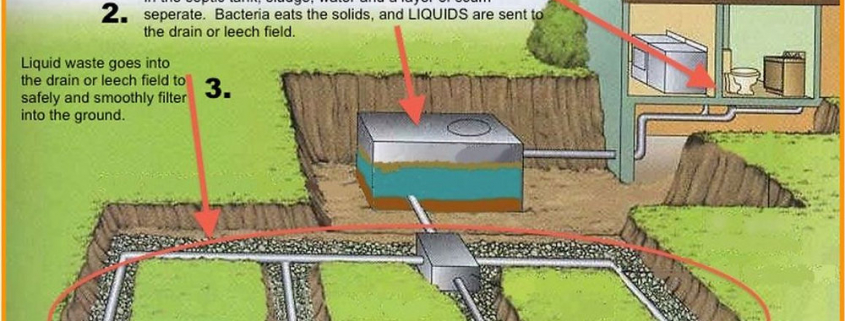Flooding And Septic Systems
During floods or heavy rains, the soil around the septic tank and in the drain field becomes saturated, or water-logged, and the effluent from the septic tank cannot properly drain through the soil. Special care needs to be taken with your septic system during and after a flood or heavy rain.
The U.S. Environmental Protection Agency (EPA) offers these guidelines:
- Relieve pressure on the septic system by using it less or preferably not at all until floodwaters recede and the soil has drained. For your septic system to work properly, water needs to drain freely in the drain field. Under flooded conditions, water cannot drain properly and can back up into your system. Remember that in most homes all water sent down the pipes goes into the septic system. This includes shower drains and washing machines.
- Avoid digging around the septic tank and drain field while the soil is waterlogged. Don’t drive heavy vehicles or equipment over the drain field. By using heavy equipment or working under water-logged conditions, you can compact the soil in your drain field, and water won’t be able to drain properly.
- Don’t open or pump out the septic tank if the soil is still saturated. Silt and mud can get into the tank if it is opened and can end up in the drain field, reducing its drainage capability. Pumping under these conditions can cause a tank to pop out of the ground.
- How can you tell if your system is damaged? Signs include soil settling, wastewater starts backing up into household drains, the soil in the drain field remains soggy and never fully drains, a foul odor persists around the tank and drain field. If you suspect your system has been damaged, have the tank inspected and serviced by a professional.
- Keep rainwater drainage systems away from the septic drain field. As a preventive measure, make sure that water from roof gutters doesn’t drain into your septic drain field. This adds an additional source of water that the drain field must process.
- If your household relies on private well water for home consumption and your property has flooded, it is important to have your well water tested for bacteria (total coliform and E. coli) through your county health department or a private certified lab.
By taking special care with your septic system after flooding, you can contribute to the health of your household, community and environment.
Excerpt from University of Florida IFAS, Savanna Barry, Regional Specialized Extension Agent Cedar Key FL, Aug. 2023, https://blogs.ifas.ufl.edu/ncbs/2023/08/30/hurricane-idalia-resources




